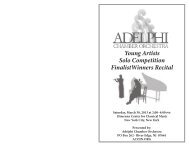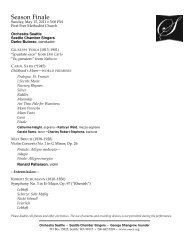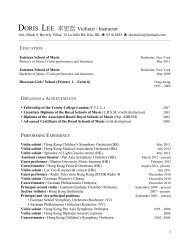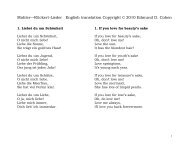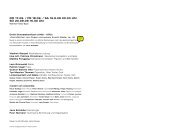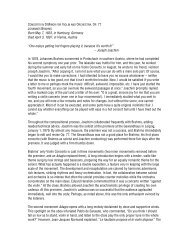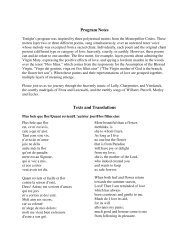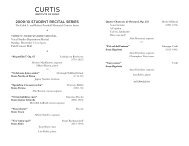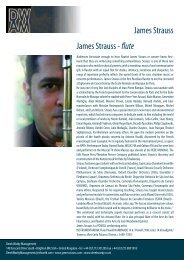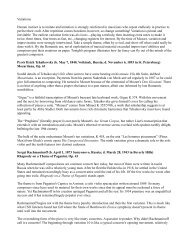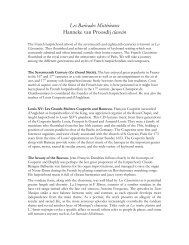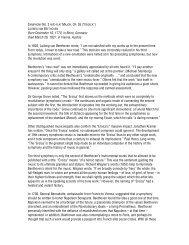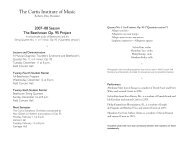Der fliegende Holländer - InstantEncore
Der fliegende Holländer - InstantEncore
Der fliegende Holländer - InstantEncore
Create successful ePaper yourself
Turn your PDF publications into a flip-book with our unique Google optimized e-Paper software.
12 London Lyric Opera<br />
Form is central to meaning. The listener<br />
is perhaps left wondering whether these<br />
contrasts in The flying Dutchman are<br />
fully planned by Wagner, or are merely<br />
the haphazard juxtaposition of his newly<br />
evolving vision stacked against the old<br />
accepted standards. Either way, it makes<br />
the debate of the score rugged and<br />
exciting, and the old versus the modern<br />
will be something that Wagner will use<br />
consciously throughout his career. From<br />
the avant-garde, sexed-up chromaticism<br />
of the Venusberg in his next work,<br />
Tannhäuser, to the stolid, old-fashioned<br />
hymn of the Knights of the Grail in his last,<br />
Parsifal, the new and the old are aids in<br />
his musical story telling. A real theatrical<br />
dialectic is thereby established.<br />
In her brilliant study Henrik Ibsen and the<br />
Birth of Modernism, probably the best<br />
book about 19th century European culture<br />
in years, Toril Moi states: “Senta, then,<br />
is the quintessentially idealist heroine.”<br />
And she is not wrong. Later she adds:<br />
“Wagner’s sublime Senta and Andersen’s<br />
The Little Mermaid come across as<br />
old-fashioned masculinist fantasies.” But<br />
maybe here she is only partly right. Senta<br />
is a marvellously rich character, by turns a<br />
child and a mature, complex woman.<br />
One of the masterstrokes of the score<br />
is to have her sing the Ballad of the<br />
Dutchman’s story almost before she has<br />
established herself in her own right. The<br />
song is full of what we have come to<br />
think of as the Dutchman’s music, and<br />
here we begin to see and feel for the<br />
first time the ramifications of Wagner’s<br />
leitmotivic method. One can ask: does the<br />
Dutchman exist in his own right, or is he<br />
willed into being only by Senta’s fantasy?<br />
Would she have a personality, a life,<br />
without his musical material to build from?<br />
What would be almost too ridiculous in<br />
spoken theatre (although again Ibsen was<br />
to triumph in exactly this symbiosis), too<br />
incredible in naturalistic emotional terms,<br />
can nevertheless be attempted by musical<br />
drama. And Wagner has found his perfect<br />
milieu, the ambiguous relationship between<br />
reality and the archetypal situation.<br />
Of course, one can see Toril Moi’s point<br />
here: the idea of a woman’s total sacrifice<br />
for a man is the very stuff of Idealist,<br />
Romantic writing: in reality, a pleasant kind<br />
of nonsense – if you’re a man. Undoubtedly,<br />
this does have some hold over the young<br />
Wagner’s young-Hegelian, Idealist thinking.<br />
But there is another, symbolic purpose: the<br />
absorption of the female and male inside<br />
every individual, the acknowledgement of<br />
the androgynous whole within each one<br />
of us – another significant preoccupation<br />
in Wagner’s prose writing. Notice how the<br />
Act II love duet begins with the Dutchman<br />
leading the emotional conversation, but by<br />
the end it is Senta who teaches him how<br />
to think and feel.<br />
In fact, something rather more modern<br />
and trendy, yin and yan, or ayurvedic,<br />
could be seen to emerge from this view,<br />
very much supported by the equal, psychic<br />
sharing and criss-crossing of musical<br />
themes. I am not at all sure that these<br />
thoughts are meant to be considered as<br />
a perfect framework for actual human<br />
relationships, but rather as a structure<br />
for inner development: Idealist, yes, but<br />
far less misogynistic. In fact, this is not a<br />
million miles from the end of Rosmersholm,<br />
when the two lovers, John Rosmer and<br />
Rebecca West, throw themselves into the<br />
Mill Race together, saying: “Not I with you,<br />
nor you with me, for we two, we are one”.<br />
And I don’t think anyone could call Ibsen<br />
Romantic or Idealist.<br />
LLO Dutchman_aw.indd 12 18/11/08 15:09:17



